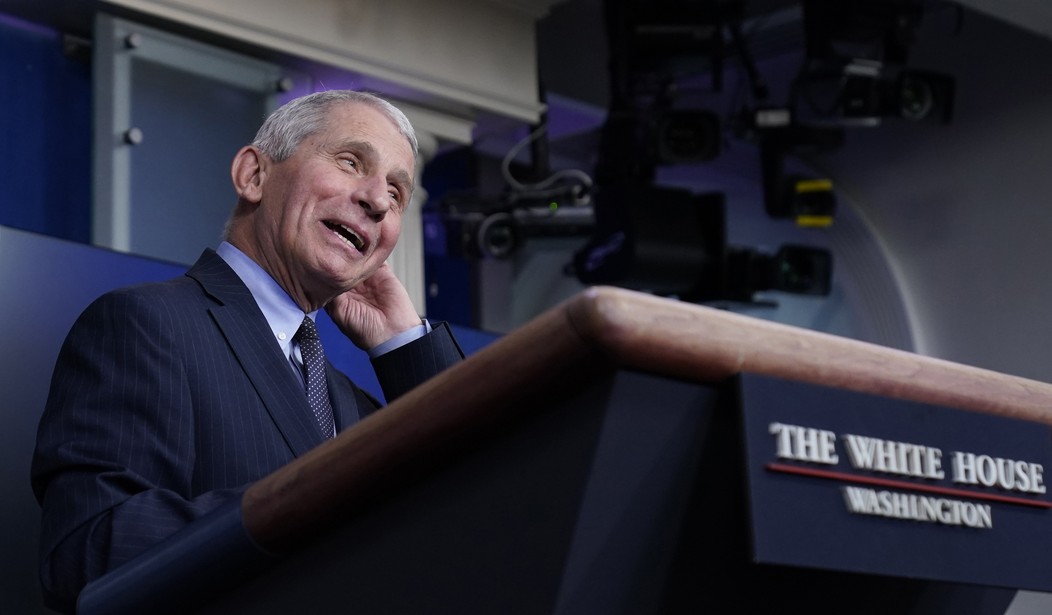Dr. Anthony Fauci is once more making his rounds on the Sunday Shows. During this most recent appearance on CNN's "State of the Union," the NIAID director shared "we're going in the wrong direction" when it comes to cases "among the vaccinated," which generated plenty of coverage. Fauci repeated the line that "it's like we have two kinds of America" when it comes to "the very vulnerable unvaccinated part, and "the really relatively protected vaccinated part." He also told host Jake Tapper towards the end that it "is under active consideration" to bring back mask mandates.
Late into the interview, though, host Jake Tapper also questioned Fauci about funding the Wuhan Institute of Virology. Dr. Fauci not only defended collaborating with the Wuhan lab, he claimed it "would be negligent" to not pursue such research, and did not indicate he would recommend an end to such research.
TAPPER: So, as a matter of policy going forward, given that the Chinese government won't allow any real investigation, do you still think the U.S. government should collaborate with labs like Wuhan, especially on research that experts consider risky?
FAUCI: Well, you know, Jake, if you go back to when this research really started, and look at the scientific rationale for it, it was a peer- reviewed proposal that was peer-reviewed and given a very high rating for the importance of why it should be done, to be able to go and do a survey of what was going on among the bat population, because everyone in the world was trying to figure out what the original source of the original SARS-CoV-1 was.
And in that context, the research was done. It was very regulated. It was reviewed. It was given progress reports. It was published in the open literature.
TAPPER: Yes.
FAUCI: So, I think if you look at the ultimate backed rationale, why that was started, it was almost as if, you didn't pursue that research, you would be negligent...
TAPPER: Right, but...
FAUCI: ... because we were trying to find out how you can prevent this from happening again.
TAPPER: But, going forward -- like, a peer review is looking -- those are doctors and scientists looking at the work of doctors and scientists...
FAUCI: Right.
TAPPER: ... without kind of factoring in the fact that you have an oppressive Chinese government...
FAUCI: Yes.
TAPPER: ... that won't allow transparency.
Going forward, are you still confident?
FAUCI: Sure. Right. Going forward, we are always going to be very, very careful, go through all kinds of review, including the risk/benefit ratio.
So, I would -- I mean, if your question Jake is, looking forward, are we going to be very careful about the research that we do, well, we have always been very careful. And, looking forward, we will continue to be very careful in what we do.
And we are always willing to reexamine the criteria that are used when you do research wherever you do them. But I think doing research in the context of where these things happen is very important.And SARS-CoV-1 originated in China. And that is the reason. If we were starting to look for bats in Secaucus, New Jersey, or Fairfax County, Virginia, it wouldn't contribute very much...
TAPPER: Yes.
FAUCI: ... to our understanding of where one SARS-CoV-1 originated.
It originated in China.
Recommended
Further, regardless of how honest Fauci has been on the issue, gain of function research was being conducted and funded at the lab. EcoHealth Alliance, as a grantee, received $600,000, and has a partnership with the Wuhan lab.
EcoHealth Alliance's CEO, Dr. Peter Daszak, was revealed to have emailed Dr. Fauci in April 2020 and thanked him for downplaying the lab leak theory. He also took part in a World Health Organization's investigation into the origins of the virus, which included visiting the Wuhan lab.
More pressingly, Fauci did defend the risks associated with gain of function research in a previous opinion piece for The Washington Post from years ago, as Rep. Mike Gallagher (R-WI) has exposed. Katie also reported on how Dr. Fauci even said a pandemic was worth the risk.
Tapper, to his credit, emphasized the dangers of a serious lack of transparency from the China, though sadly that should not be surprising when it comes to the Chinese Communist Party.
If Fauci is indeed serious about wanting to figure out the origin of the Wuhan coronavirus, he should use what influence he still has among the circles that he does and urge more thorough investigations into the Wuhan lab. Unfortunately, Democratic lawmakers would prefer to keep the focus on blaming Donald Trump for how he handled the virus during his presidency, even if it means not giving investigations the attention it deserves.























Join the conversation as a VIP Member